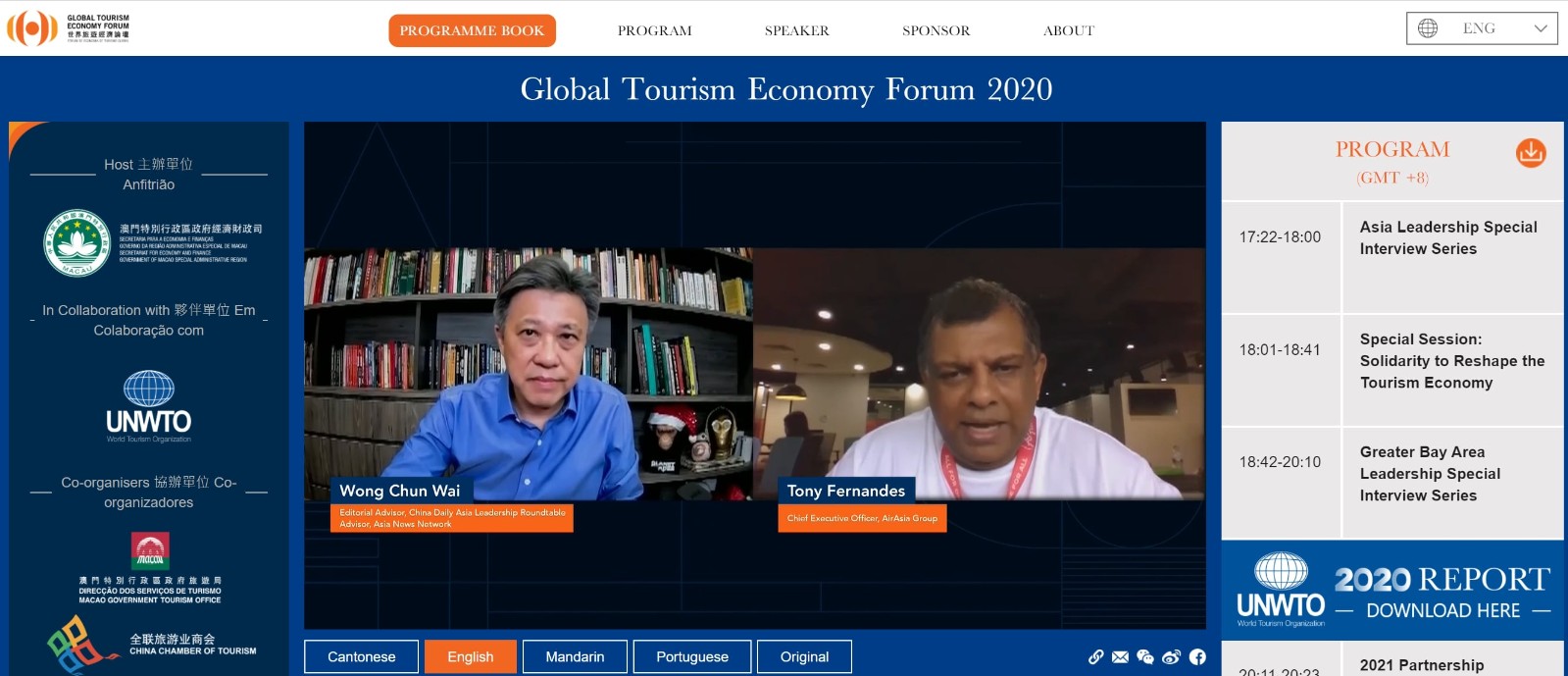2020-12-10
Chai Hua and Sophie He

Facing the massive impact of the coronavirus pandemic, the world's tourism industries are determined to work together and rebuild confidence through innovation and cooperation. Officials and leaders agreed on the vision at the ninth session of the Global Tourism Economy Forum in Macao on Wednesday. The theme of this year’s forum, hosted by Macao Secretariat for Economy and Finance, is “Solidarity and Innovation: Reshaping Tourism in the New Global Economy”. Under the regular control and prevention measures against the pandemic, this edition of GTEF adopted both online and offline engagements for the first time. In his welcoming address, former Macao chief executive Edmund Ho Hau-wah, who is now vice-chairman of the National Committee of the Chinese People's Political Consultative Conference and chairman of the GTEF, said the brand new hybrid online and offline approach demonstrated the use of the innovative technology. He admitted the world is facing one of the most unanticipated events of the century and called for leveraging technological innovations to establish new business models, stimulating development of digital markets, and injecting new momentum for enhancing the resilience and vitality of the tourism economy. He also highlighted that there's a great need to strengthen cooperation and jointly respond to the new global landscape. Gao Yunlong, vice-chairman of the CPPCC National Committee, pointed out through a video call that the world’s tourism industries should “adhere to the mindset of openness and inclusive, innovation-driven development and sharing cooperation results”. Macao Secretary for Social Affairs and Culture Ao Ieong U, representing Macao Chief Executive Ho Iat-seng, said the special administrative region’s tourism industry has been on the recovery track since cross-boundary travel resumed between Macao and the mainland in August. She said the nation’s new development pattern of dual-circulation presents new opportunities for Macao’s diversified growth and called for Macao to make good use of them, as well as the city’s unique regional advantages. Zurab Pololikashvili, secretary general of the World Tourism Organization, said during the GTEF opening ceremony that the event shows the power of cooperation by bringing together leaders from across the public and private sectors. “We have presented support for tourists from the United Nations, from governments and from international organizations. When tourist workers and business needed us, we stepped up to help them,” Pololikashvili said. The theme of is this year’s GTEF could not be more appropriate, he said, pointing out that solidarity and innovation will shape the tourism industry in the new global economy. “And we need to carry this same spirit forward this day as we reshape tourism in the new global economy.” To achieve this, he said, people need to work smarter and not only just harder. Innovation will go a long way toward making this possible. And the innovation and startup competitions have shown the diversity of talent that the tourism sector can count on. “We're identifying new ideas and hearing new voices,” Pololikashvili said, adding that innovation and entrepreneurship are key to restarting tourism, and innovation can also ensure that the benefits tourists bring are spread more widely, creating new jobs and providing opportunities for those who might otherwise be left behind. Hu Heping, China’s minister of culture and tourism and GTEF honorary chairman, proposed several initiatives for the tourism industry. The first is to adhere to mutual benefit and win-win results while deepening international tourism cooperation. He stressed that China is willing to work with other countries to carry out more extensive multilateral and bilateral regional tourism exchanges and cooperation, accelerate the recovery and revitalization of the world tourism industry, and actively participate in the construction of the global tourism governance system. The second is to strengthen overall coordination and optimize the tourism business environment. The third is to promote innovation and creativity and improve the quality of tourism development. “Innovation is the first driving force leading development,” Hu said. “Facing the challenge of the pandemic, it is necessary to support the innovation and development of the tourism industry, introduce more new formats, new entities, and new models, improve sustainable development capabilities, and make good use of new technologies such as 5G, big data, cloud computing, and artificial intelligence to provide tourists with a safer and more comfortable travel experience.” grace@chinadailyhk.com